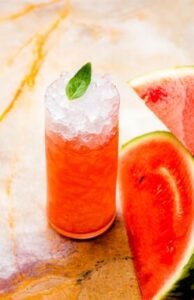Medically reviewed by Dr. Ramesh Gaddam, M.D. — Written by Sumalatha, D.N.H.E
Table of Contents
ToggleStaying hydrated in summer is super important! When it’s hot, our bodies lose water through sweat, and not drinking enough can lead to dehydration. Drinking plenty of water helps us stay cool, avoid heat-related illnesses, and feel refreshed. So, keep sipping to stay healthy and happy!
Iced Tea:
Iced tea is the quintessential summer refreshment, offering a cool, flavorful respite from the heat.

Whether lounging by the pool or enjoying a picnic in the park, iced tea is a versatile and satisfying drink that can be customized to suit any taste.
Types of Tea:
There are three Types of Tea mentioned below:
Black Tea:
Traditional and robust, black tea is a popular choice for iced tea due to its bold flavor.
It stands up well to ice and additional ingredients, making it ideal for mixing with lemon or other fruits.
Green Tea:
Lighter and more delicate, green tea offers a refreshing alternative for iced tea.
Its grassy and slightly vegetal notes pair well with citrus or mint, creating a crisp and revitalizing drink.
Herbal Tea:
For caffeine-free options, herbal teas such as chamomile, hibiscus, or rooibos are excellent choices.
Their natural sweetness and diverse flavor profiles lend themselves well to iced tea, especially when combined with fruity additions like berries or peach slices.
Brewing Methods and Tips:
Following are very important brewing methods used and tips followed:
Hot Brewing:
Start by brewing a strong concentrate of your chosen tea using hot water, typically double the strength you would use for hot tea.
Steep the tea for 3 to 5 minutes, then strain and allow it to cool before refrigerating.
This method helps the tea maintain its flavor when diluted with ice.
Cold Brewing:
Alternatively, you can cold brew tea by steeping it in cold water overnight in the refrigerator.
This method produces a smoother, less bitter brew that is perfect for iced tea.
Simply combine tea leaves with cold water in a pitcher and let it steep for 8 to 12 hours.
Sweetening:
Add sweetener while the tea is still warm to ensure it dissolves completely.
Traditional choices include sugar or honey, but you can also use alternatives like agave syrup or stevia for a healthier option.
Flavor Variations and Additions:
There are some flavor variations and additions:
Lemon:
Slices of fresh lemon add a bright, citrusy zing to iced tea.
Squeeze the juice into the tea before adding the slices for extra flavor.
Mint:
Fresh mint leaves lend a refreshing and invigorating touch to iced tea.
Crush the leaves gently before adding them to release their aromatic oils.
Fruit:
Experiment with different fruits to add natural sweetness and complexity to your iced tea.
Berries, peaches, and pineapple are all delicious options.
Simply muddle the fruit or add slices to the tea before serving for a burst of flavor.
Herbs and Spices:
Get creative with herbs and spices like basil, ginger, or cinnamon for unique flavor combinations.
These additions can elevate your iced tea and make it truly memorable.
Whether you prefer it classic and simple or loaded with flavorful additions, iced tea is the perfect companion for summer days, offering a cool and refreshing escape from the heat.
Lemonade:
Lemonade is the epitome of summer refreshment, evoking memories of lazy afternoons and backyard gatherings.

Its tangy sweetness and citrusy kick make it a beloved classic that never goes out of style.
Whether enjoyed on a hot day or served at a picnic, lemonade is sure to quench your thirst and lift your spirits.
Basic Lemonade Recipe:
Ingredients, Instructions, variations and Tips are:
Ingredients:
- 1 cup freshly squeezed lemon juice (about 4-6 lemons)
- 1 cup granulated sugar
- 4 cups cold water
- Ice cubes
Instructions:
- In a pitcher, combine the freshly squeezed lemon juice and granulated sugar.
- Stir until the sugar is completely dissolved.
- Add cold water and stir well to combine.
- Taste and adjust sweetness or tartness by adding more sugar or lemon juice if needed.
- Serve over ice and enjoy!
Variations:
Three types of variations:
Classic Lemonade:
Stick to the basic recipe for a timeless and refreshing drink that captures the essence of summer.
Strawberry Lemonade:
Add sliced strawberries to the basic lemonade recipe for a burst of fruity flavor and a beautiful pink hue.
You can also blend the strawberries with the lemon juice before straining for a smoother texture.
Raspberry Lemonade:
Mix in fresh or frozen raspberries to your lemonade for a tangy twist and vibrant color.
You can either muddle the raspberries with the lemon juice or blend them before straining.
Tips for Balancing Sweetness and Tartness:
Best tips for Balancing Sweetness:
Taste as you go:
Adjust the amount of sugar and lemon juice according to your preference.
Some like their lemonade sweeter, while others prefer it more tart.
Simple syrup:
If you find that the sugar doesn’t dissolve well, consider making a simple syrup by heating equal parts sugar and water until the sugar dissolves completely.
Allow it to cool before mixing it with the lemon juice and water.
Use ripe lemons:
Ripe lemons tend to be juicier and sweeter, resulting in a more balanced flavor in your lemonade.
Serving Suggestions and Garnishes:
Important serving suggestions:
Mint Sprigs:
Add a touch of freshness and aroma by garnishing your lemonade with sprigs of fresh mint.
You can also muddle the mint leaves in the bottom of the glass for a more intense mint flavor.
Lemon Slices:
Float a few lemon slices in the pitcher or glasses for a decorative touch and an extra burst of citrus aroma.
Ice Cubes:
Serve your lemonade over plenty of ice cubes to keep it cold and refreshing on hot summer days.
Whether you stick to the classic recipe or get creative with fruity variations, lemonade is a delightful and versatile drink that embodies the essence of summer.
With its perfect balance of sweetness and tartness, it’s sure to be a hit at any gathering or simply enjoyed on a lazy afternoon.
Cold Brew Coffee:
Cold brew coffee is a popular alternative to hot coffee, known for its smooth and mellow flavor profile with less acidity.

It’s brewed using cold water over an extended period, resulting in a concentrated coffee extract that can be diluted and served over ice.
This method of brewing highlights the coffee’s natural sweetness and subtle flavors, making it a favorite among coffee enthusiasts, especially during warmer months.
How to Make Cold Brew Coffee at Home:
Ingredients and Instructions for maiing cold brew coffee at home.
Ingredients:
- Coarsely ground coffee beans
- Cold water
- Optional: milk, syrup, spices for customization
Instructions:
Instructions for making are:
Grind the Coffee:
Start with coarsely ground coffee beans.
A coarse grind helps prevent over-extraction, resulting in a smoother brew.
Aim for a ratio of 1:4 coffee to water for a strong concentrate, adjusting to taste preferences.
Combine Coffee and Water:
In a large container or pitcher, mix the ground coffee with cold water.
Stir to ensure all the coffee grounds are saturated.
Cover the container and let it steep at room temperature for 12 to 24 hours. The longer the steeping time, the stronger the brew.
Strain the Coffee:
After steeping, strain the coffee mixture through a fine-mesh sieve, cheesecloth, or a coffee filter into another container to remove the grounds.
You may need to strain it twice for a cleaner brew.
Serve and Enjoy:
Dilute the cold brew concentrate with water or milk to your desired strength and pour it over ice.
Add any desired syrups, spices, or flavorings for customization.
Serving Suggestions and Customization Options:
Customize your summer drinks with various serving suggestions.
Milk:
Cold brew coffee can be enjoyed black or with milk.
Add dairy or non-dairy milk like almond milk, oat milk, or coconut milk for a creamy touch.
Syrups:
Enhance the flavor of your cold brew with syrups like vanilla, caramel, or hazelnut.
Stir in the syrup before adding milk or water.
Spices:
Experiment with spices such as cinnamon, cardamom, or nutmeg to add depth and warmth to your cold brew.
Simply sprinkle a pinch of your chosen spice into the coffee before serving.
Flavored Ice Cubes:
Freeze coffee or milk into ice cube trays for flavored ice cubes that won’t dilute your cold brew as they melt.
Ground Coffee and Steeping Time
Importance of Using Coarsely Ground Coffee Beans and Proper Steeping Time:
Coarse Grind:
Coarsely ground coffee beans are essential for cold brew because they extract more slowly, resulting in a smoother and less bitter brew.
Finely ground coffee can lead to over-extraction and a harsh, unpleasant taste.
Proper Steeping Time:
Steeping the coffee grounds for 12 to 24 hours allows for optimal flavor extraction without the need for heat.
Longer steeping times can produce a stronger concentrate, but be cautious not to over-steep, as it can result in bitterness.
Cold brew coffee offers a refreshing and customizable alternative to hot coffee, perfect for enjoying on hot summer days or anytime you crave a smooth caffeine fix.
With its simple brewing process and versatile serving options, it’s easy to make and enjoy at home.
Smoothies:
Smoothies are the ultimate summer indulgence, offering a delicious and refreshing way to pack in essential nutrients while beating the heat.

Whether you’re looking for a quick breakfast on-the-go or a post-workout pick-me-up, smoothies are versatile, customizable, and bursting with flavor.
Basic Smoothie Formula:
Smoothie Formula Basics are:
Fruit:
Start with a base of fresh or frozen fruit.
Popular options include berries, bananas, mangoes, and pineapples. Fruit adds natural sweetness, fiber, and a variety of vitamins and minerals to your smoothie.
Liquid:
Add a liquid component to help blend the ingredients smoothly.
Options include milk (dairy or non-dairy), yogurt, coconut water, or fruit juice.
Adjust the amount of liquid based on your desired consistency.
Optional Extras:
Enhance your smoothie with nutritious extras such as leafy greens (spinach, kale), protein powder, nut butter, seeds (chia, flaxseed), or oats.
These additions can boost the nutritional content and provide sustained energy.
Health Benefits of Smoothies
Delicious and Nutritious Smoothie Combinations.
Berry Blast
Blend together mixed berries (strawberries, blueberries, raspberries), banana, spinach, and almond milk.
Berries are rich in antioxidants, while spinach adds fiber and vitamins.
Tropical Paradise
Combine pineapple, mango, coconut water, and a squeeze of lime juice.
This tropical blend is packed with vitamin C, potassium, and electrolytes.
Green Goddess
Blend spinach, kale, avocado, banana, almond milk, and a spoonful of honey or agave syrup.
This green powerhouse is loaded with vitamins, minerals, healthy fats, and fiber.
PB&J Delight
Mix strawberries, banana, peanut butter, Greek yogurt, and a splash of milk.
This smoothie provides protein, healthy fats, and a nostalgic flavor reminiscent of a classic peanut butter and jelly sandwich.
Desired Consistency
To create the perfect smoothie, use these tips to ensure a creamy texture and balanced flavor:
Frozen Fruit
Use frozen fruit instead of ice to keep your smoothie cold and creamy without diluting the flavor.
Consistency
Adjust the amount of liquid to achieve your desired consistency. Start with less liquid and add more as needed to avoid a runny smoothie.
Blending Order
Layer ingredients in the blender with softer ingredients at the bottom and harder ingredients on top to ensure even blending.
Avoiding Sugar Bombs
Be cautious with sweeteners like honey, maple syrup, or flavored yogurt, as they can quickly add extra calories and sugar. Opt for natural sweetness from fruits instead.
Experiment
Don’t be afraid to get creative and experiment with different combinations of fruits, vegetables, and add-ins to find your favorite flavor profiles and nutrient combinations.
Smoothies are not only delicious but also a convenient way to sneak in extra servings of fruits, vegetables, and other nutrient-rich ingredients.
With endless possibilities for customization, they’re the perfect summer treat for staying cool, hydrated, and nourished.
Watermelon Agua Fresca:
Agua fresca, Spanish for “fresh water,” is a popular beverage in Latin America known for its light and hydrating qualities, making it the perfect thirst-quencher on hot summer days.

Among its many variations, watermelon agua fresca stands out for its refreshing taste and cooling properties, making it a favorite among both kids and adults alike.
How to Make Watermelon Agua Fresca:
Ingredients:
- 4 cups fresh watermelon, cubed and seeds removed
- Juice of 2 limes
- 1-2 tablespoons honey or agave syrup (optional, depending on sweetness of watermelon)
- 2 cups cold water
- Ice cubes
Instructions:
- In a blender, combine the fresh watermelon cubes, lime juice, and honey or agave syrup if using.
- Blend until smooth.
- Strain the mixture through a fine-mesh sieve or cheesecloth into a pitcher to remove any pulp or seeds.
- Stir in cold water to dilute the mixture to your desired taste.
- Chill in the refrigerator until ready to serve.
- Serve over ice cubes and garnish with fresh mint leaves or cucumber slices, if desired.
Serving Suggestions:
Follow the Serving suggestions:
Frozen Fruit
Use frozen fruit instead of ice to keep your smoothie cold and creamy without diluting the flavor.
Consistency
Adjust the amount of liquid to achieve your desired consistency. Start with less liquid and add more as needed to avoid a runny smoothie.
Blending Order
Layer ingredients in the blender with softer ingredients at the bottom and harder ingredients on top to ensure even blending.
Avoiding Sugar Bombs
Be cautious with sweeteners like honey, maple syrup, or flavored yogurt, as they can quickly add extra calories and sugar. Opt for natural sweetness from fruits instead.
Experiment
Don’t be afraid to get creative and experiment with different combinations of fruits, vegetables, and add-ins to find your favorite flavor profiles and nutrient combinations.
Benefits of Watermelon:
Hydration and Cooling Effects:
High Water Content
Watermelon is composed of about 92% water, making it an excellent hydrating fruit, perfect for replenishing fluids lost on hot summer days.
Electrolytes
Watermelon also contains essential electrolytes like potassium and magnesium, which help maintain hydration and balance electrolyte levels in the body.
Lycopene
The vibrant red color of watermelon comes from lycopene, a powerful antioxidant that helps protect cells from damage and may have anti-inflammatory properties.
Cooling Effect
Watermelon’s high water content combined with its natural sweetness creates a cooling sensation when consumed, making it a refreshing choice for staying cool during the summer heat.
Watermelon agua fresca is not only delicious but also a healthy and hydrating alternative to sugary drinks.
With its simple preparation and customizable flavors, it’s the perfect beverage to enjoy at picnics, barbecues, or any summer gathering.
Cucumber Mint Cooler:
The cucumber mint cooler is a quintessential summer beverage, known for its crisp and refreshing taste that rejuvenates the senses.

This cooling drink combines the subtle sweetness of cucumber with the invigorating aroma of fresh mint, making it a perfect choice for staying hydrated and revitalized on hot days.
Recipe for Cucumber Mint Cooler:
Ingredients and instructions for cucumber mint cooler recipe.
Ingredients:
- 1 medium cucumber, peeled and sliced
- Handful of fresh mint leaves
- Juice of 1 lime
- 2 cups cold water
- Ice cubes
- Optional: honey or agave syrup for sweetness
Instructions:
- In a blender, combine the cucumber slices, mint leaves, lime juice, and cold water.
- Blend until smooth.
- Taste and adjust sweetness by adding honey or agave syrup if desired.
- Strain the mixture through a fine-mesh sieve or cheesecloth to remove any pulp.
- Chill in the refrigerator until ready to serve.
- Serve over ice cubes and garnish with extra cucumber slices and mint leaves.
Variations:
Additional Ingredients and variations.
Ginger Twist:
Add a few slices of fresh ginger to the blender for a spicy kick and added digestive benefits.
Honey-Lime:
Sweeten the cooler with honey instead of sugar for a natural sweetness that complements the fresh flavors.
Sparkling Cucumber Mint Cooler:
Replace still water with sparkling water or soda water for a bubbly twist.
Cucumber Lemon Mint:
Swap lime juice for lemon juice for a slightly different citrus flavor profile.
Health Benefits of Cucumber and Mint:
Following are some of benefits of cucumber and min for health
Hydration
Cucumbers are composed of about 95% water, making them an excellent hydrating ingredient.
Mint also contains a high water content, contributing to overall hydration.
Digestion
Both cucumber and mint are known for their digestive properties.
Cucumbers contain fiber and water, aiding digestion and preventing constipation.
Mint soothes upset stomachs and promotes healthy digestion.
Antioxidants
Cucumbers and mint are rich in antioxidants, neutralizing harmful free radicals in the body and reducing inflammation.
Vitamins and Minerals
Cucumbers are a good source of vitamins C and K, while mint provides small amounts of vitamins A and C, as well as minerals like iron and potassium.
The cucumber mint cooler is not only a delicious and refreshing beverage but also a hydrating and healthful choice.
With its simple ingredients and customizable flavors, it’s the perfect drink to enjoy throughout the summer season.
Summary:
Stay cool this summer with refreshing drinks like iced tea, lemonade, cold brew coffee, watermelon agua fresca, and cucumber mint cooler.
Customize recipes to your taste.
Hydration is vital, so drink up and enjoy the season’s flavors!
Also Read:
Rhubarb: Benefits, Nutrition, Uses, Side Effects
Blueberries: Benefits, Nutrition, Uses, Side Effects
Medically reviewed by Dr. Ramesh Gaddam, M.D.

General Physician, Diabetologist, and Critical Care Specialist.
Related
Discover more from Health Build-Up
Subscribe to get the latest posts sent to your email.

1 thought on “6 Refreshing Summer Drinks to Cool Your Body”
Comments are closed.